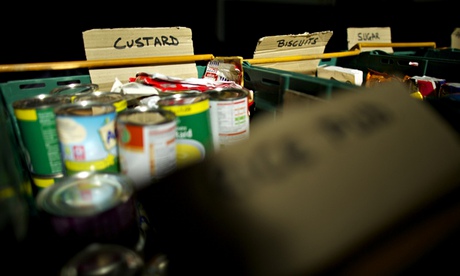
The prevalence of poverty–stricken families who cannot afford to buy sufficient food is overtaking unhealthy eating as the most pressing public health concern, a public health specialist has claimed.
The claim is made in a BBC Panorama documentary to be broadcast on Monday evening which found that over a third of local authorities in England and Wales were now providing funding for food banks, despite government claims that charity food is not a part of the social security system.
Julie Hirst, public health specialist at Derbyshire county council, told Panorama the authority had invested £126,000 from its public health budget in food banks.
She said: "It's now become an issue of food poverty and some people in the country are not being able to eat at all – and if people can't eat at all, what's the point in trying to get them to eat healthily?"
Elizabeth Dowler, a professor at Warwick University and the co-author of a recent government-commissioned report on food aid provision, told the programme it was shocking so many councils were investing in food banks.
"Food banks are an inadequate plaster over a gaping wound … They do not solve the problems. And that they should be enshrined as an inadequate solution is deeply immoral."
The programme also uncovers evidence that a job centre appears to be explicitly alerting its staff to the financial savings to be made through "sanctioning" job seekers when they are judged to have broken benefit conditions.
A wall chart in a Grantham job centre explicitly sets out the cash savings available to the Department for Work and Pensions (DWP) through stopping the benefits of claimants, ranging from £227.20 a week for a four-week sanction to £3,728 for a sanction lasting one year.
The DWP told Panorama: "This was an isolated incident and does not reflect our policy on sanctions."
Charities and campaigners say record totals of DWP sanctions – 875,000 in the year to September 2013 – are a prime reason why people are forced to turn to food banks.
They complain that many sanctions are unfair and unjustifiable, and that hundreds of people are wrongly penalised every day forcing them to survive for weeks on little or no money.
The DWP insists there is no robust link between welfare reforms and the rise in food bank use.
The programme interviews a mother of two who says her family's health suffered after she was wrongly sanctioned for three months after a clerical mix up, leaving them on reduced income.
Suzanne Harkins, who lives in Paisley, Scotland, told Panorama: "It was devastating. It got to a point that there was no food in the house and any food that did come in had to feed the two children and my husband and I would go for days at a time without eating.
"I was still breastfeeding Mason at the time and I stopped producing milk because I wasn't getting enough nourishment into me to produce milk to breastfeed him."
The two councils covering the parliamentary constituency of Iain Duncan Smith, the work and pensions minister – Redbridge council and Waltham Forest council – have given over £70,000 to combat food poverty, the programme found.
The DWP said local authorities, who run local welfare assistance programmes, most of which refer vulnerable residents to emergency food charities, were best placed to fund food banks.
However, the DWP said earlier this year that it would stop its £180m funding for council local welfare schemes in 2015, a move that charities warned would trigger a rise in the number of people becoming dependent on food banks or loan sharks to survive.
Hungry Britain?, 8.30pm, Monday 3 March, BBC One

